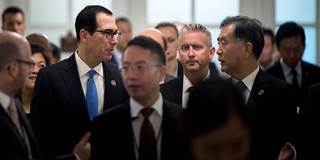US President Donald Trump may think that his approach to China amounts to putting “America first.” Yet his policies will hurt not only China, but also the US and the rest of the world, not least by undermining leaders' ability to address shared challenges like inequality and climate change.
HONG KONG – Trade tariffs may be getting the most attention, but the conflict between the United States and China is actually being fought on multiple fronts, including exchange rates, technology, cyberspace, and even arms. This does not bode well for the world’s capacity to confront shared challenges, from migration to climate change.
According to Bob Woodward, the doyen of Washington journalists, the modus operandi of US President Donald Trump’s administration is “maximize aggression to conceal vital weaknesses.” And, indeed, when it comes to China, Trump is betting that a hostile tone, backed by reckless but impressive threats, will divert American voters’ attention from serious domestic problems ahead of November’s midterm elections.
This short-sighted strategy contrasts sharply with the long game being played by the Chinese authorities. Though the Shanghai Composite Index has fallen far more than the Dow Jones Index, reaching its lowest level since November 2014, China is keeping the renminbi from depreciating so much that the US would label the country a currency manipulator.

HONG KONG – Trade tariffs may be getting the most attention, but the conflict between the United States and China is actually being fought on multiple fronts, including exchange rates, technology, cyberspace, and even arms. This does not bode well for the world’s capacity to confront shared challenges, from migration to climate change.
According to Bob Woodward, the doyen of Washington journalists, the modus operandi of US President Donald Trump’s administration is “maximize aggression to conceal vital weaknesses.” And, indeed, when it comes to China, Trump is betting that a hostile tone, backed by reckless but impressive threats, will divert American voters’ attention from serious domestic problems ahead of November’s midterm elections.
This short-sighted strategy contrasts sharply with the long game being played by the Chinese authorities. Though the Shanghai Composite Index has fallen far more than the Dow Jones Index, reaching its lowest level since November 2014, China is keeping the renminbi from depreciating so much that the US would label the country a currency manipulator.